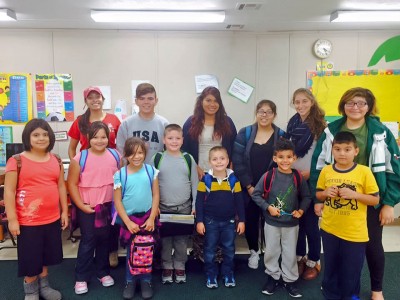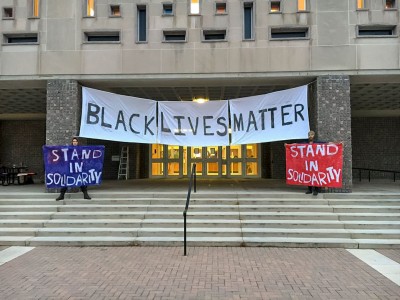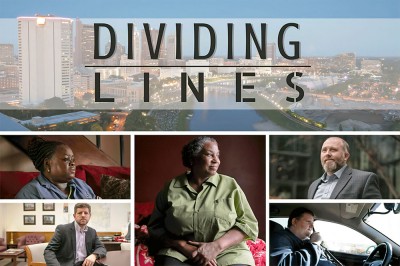As a Social Justice major or minor, you will engage in a semester-long project of mentored activism. The project will help you develop the skills necessary to apply academic knowledge to real-world problems, under the advisement of a Social Justice faculty member.
Frequently Asked Questions
What are the goals of Mentored Activism requirement?
As a Social Justice major, you will:
- Participate in a community-based learning experience, community organizing, and/or advocacy work with an organization that has a social justice mission;
- Gain practical experience of working with diverse constituencies and populations by partnering with community members to identify a common problem and then develop a plan to address the problem.
How is Mentored Activism different from an Internship?
Mentored Activism:
- Focuses on some form of (identified) inequality
- Challenges existent power relations/social structures
- Orients toward creating change (as in altering order, distribution, and/or power balance)
- May involve advocacy for marginalized people
- May be tied to social movements
- Feels more like “dissent/voice”
Internships are valuable learning experiences in many disciplines. However, most internships involve the activities listed below and these activities would not be sufficient for Mentored Activism:
- Does not challenge in major way existent power and/or institutions
- Involves interactions built on existent institutions (maintains status quo)
- Orients more toward “helping others” in human services
- Provides service/support, often as a volunteer
- Feels more like “charity”
Want to know more about the difference? See: Bubriski, Anne and Semann, Ingrid (2009) “Activist Learning vs. Service Learning in a Women’s Studies Classroom,” Human Architecture: Journal of Sociology of Self-Knowledge: Vol. 7: Iss. 3, Article 8.
When should I complete my Mentored Activism Experience?
Social Justice majors should enroll in Mentored Activism after successfully completing the foundational courses (SJ 110, EDUC 115), research methods (SOAN 279) and a theorizing Social Justice course (PHIL 354, SOAN 358, WGS 499D) and before the SJ Capstone (SJ 499). Typical enrollment will be spring of junior year or fall of senior year. Social Justice minors should work with their faculty mentor to determine when best to complete Mentored Activism.
How and with whom do I sign up for Mentored Activism?
When you are ready to begin your Mentored Activism experience, you should identify a Social Justice faculty member to serve as your mentor and enroll in SJ 390 with the identified faculty member (see faculty in the Social Justice major). You will work with your mentor to develop a Mentored Activism Proposal (see “Proposal Template” below). Upon approval of the proposal from the SJ Program Directors, you will begin your experience. During your Mentored Activism experience, you will reflect bi-weekly on your experience. At the end, you will write a final reflective paper connecting your community-based learning experience to your classroom work (see “Reflective Prompts” below). For questions regarding mentored activism, contact Dr. Paul Dean, Advisor for the Social Justice major.
Where can I find examples of prior Mentored Activism Experiences?
Please see the “Examples of Mentored Activism” section below.
Reflective Prompts
Each bi-weekly reflection should begin with a brief summary of your week’s work, including the number of hours you worked.
The following are sample prompts that might guide your reflective process. You do not need to answer them specifically, especially if they are not appropriate for a week; but do dig deep and go beyond a simple description of your weekly activities.
- Challenges faced the past two weeks and how you met them
- Successes realized and how you achieved them
- Critical incidents and what you learned from them
- Links to your course content – how is what you are seeing or experiencing consistent or different from the content studied in related courses at OWU?
- Questions that have arisen
Final Reflection Questions
- Overall, was this experience what you anticipated it would be? Why or why not?
- How will this experience influence your longer-term personal, academic, and career goals?
- What skills and/or knowledge did you develop that will help you to make progress toward those goals? How do the skills and knowledge you gained during your mentored activism experience relate to or extend the content you studied in your Social Justice courses at OWU?
- What question(s) would you like to continue exploring?
Mentored Activism Proposal Template
Project Description
Provide a description of your Will you be completing this by yourself, with a community organization, or with a campus organization? What is the goal of the project? Can you provide evidence of a documented need for your project? Include a timeline for the duration of your project.
Connecting to Theory and Coursework
How will you draw upon your previous coursework and theory to inform your project? How will reflection be accomplished during your project?
Results and Outcomes
What do you hope or expect to be a final product or outcome for your project?
Connecting to Longer-Term Goals
How will this relate to your long-term goals? What skills will you develop, or knowledge will you attain, that will help you to progress toward those goals? What questions would you like to continue exploring as you undertake your project? How will you balance this project with your other commitments and not get burned out?
Examples of Mentored Activism Experiences
For ideas on developing and implementing Mentored Activism Experiences, refer to the examples below from past and current OWU students. Think big and take action!
Rosa Escobar: Mentoring and Social Entrepreneurship
 When Rosa Escobar ’17 began her work in the community, she was deeply concerned about parents who couldn’t communicate with teachers because of a language barrier. To support these families, Rosa co-created an innovative, one-of-a-kind program entitled “Hispanic and Latino Outreach” (HALO). Through the program, Rosa got connected with kids who shared her first-generation background.
When Rosa Escobar ’17 began her work in the community, she was deeply concerned about parents who couldn’t communicate with teachers because of a language barrier. To support these families, Rosa co-created an innovative, one-of-a-kind program entitled “Hispanic and Latino Outreach” (HALO). Through the program, Rosa got connected with kids who shared her first-generation background.
To support these families, Rosa helped create a local chapter of Healthy Alternative for Little Ones (HALO) and got connected with children who shared her first-generation background.
By building the HALO program, Rosa developed her mentorship and leadership skills while working with a variety of students, from elementary school to high school. These skills and her community activism in and around Delaware helped Rosa obtain a job as the Program Coordinator for Dicke Scholars and the Office of Multicultural Student Affairs at OWU after graduation.
Teona Council: Campus Activism with Interracial Dialogues
 Tackling sensitive issues like racism are very challenging, but Teona Council knew she could be most effective by building bridges across different groups.
Tackling sensitive issues like racism are very challenging, but Teona Council knew she could be most effective by building bridges across different groups.
To help promote meaningful dialogue, Teona organized interracial dialogues in a variety of venues. First, she worked with faculty to offer panel conversations on issues of racial identity and justice in their classrooms.
Second, she developed panels open to the campus community where audiences could hear about experiences from panel members of different racial groups, share their own thoughts, and ask anonymous questions.
Using what she learned throughout her coursework in Sociology, Anthropology, and Social Justice, Teona brought her curriculum with her to every panel and used it as a way to truly speak to the whole OWU community and turn theory into practice right here on campus.
With the skills she developed in intercultural communication, organizing, and program design, Teona was offered a position as a Diversity Officer upon graduation due to her incredible achievements in Social Justice at OWU.
Trevor Martin: Grassroots Community Organizing
 When Trevor Martin transferred to OWU to pursue a Social Justice major, he knew he wanted to put theory into practice through grassroots activism.
When Trevor Martin transferred to OWU to pursue a Social Justice major, he knew he wanted to put theory into practice through grassroots activism.
Wanting to ensure students had a first-hand experience in combating poverty and building a sustainable future, Trevor teamed with new Social Justice students and the Mid-Ohio Workers Association (MWA). Mid-Ohio Workers Association fights for the eradication of poverty through grassroots, community-based activism.
For Trevor, this hands-on opportunity allowed him to put to work all the theories he has learned as a social justice major. He is now honing skills in community organizing, leadership development and training, and advocacy.
Trevor continues to partner with community groups like MWA and in his role as Social Justice Program Assistant.

 When Rosa Escobar ’17 began her work in the community, she was deeply concerned about parents who couldn’t communicate with teachers because of a language barrier. To support these families, Rosa co-created an innovative, one-of-a-kind program entitled “Hispanic and Latino Outreach” (HALO). Through the program, Rosa got connected with kids who shared her first-generation background.
When Rosa Escobar ’17 began her work in the community, she was deeply concerned about parents who couldn’t communicate with teachers because of a language barrier. To support these families, Rosa co-created an innovative, one-of-a-kind program entitled “Hispanic and Latino Outreach” (HALO). Through the program, Rosa got connected with kids who shared her first-generation background. Tackling sensitive issues like racism are very challenging, but Teona Council knew she could be most effective by building bridges across different groups.
Tackling sensitive issues like racism are very challenging, but Teona Council knew she could be most effective by building bridges across different groups. When Trevor Martin transferred to OWU to pursue a Social Justice major, he knew he wanted to put theory into practice through grassroots activism.
When Trevor Martin transferred to OWU to pursue a Social Justice major, he knew he wanted to put theory into practice through grassroots activism.